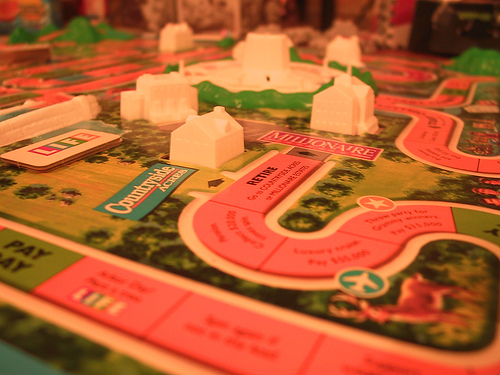Flash Fiction by Joanne Avallon
Beauty
It stops her paddle midstroke. The marsh at sunset in October, golden reeds and deep blue water, geese, a glinting triangle in a stern autumn sky. It’s the kind of beauty she knows will disappear if she blinks. In myth, people have gouged out their eyes to avoid seeing ugliness, but has anyone, she wonders, ever cut off their eyelids so they would not miss beauty?
The only beauty she has seen that took its time was that of her children, especially when they were newborn and she had hours to see every inch of them. But now, of course, they are grown and leaving. She stills her kayak and calls back to her husband, eyes still trained ahead, “Why does beauty make us sad?” He doesn’t answer. He doesn’t answer her much anymore, as though in the last few years she has started speaking to him in a foreign language.
Sad, too, she thinks. Once, she thought he understood her perfectly and could see what she was seeing, but now she is alone in her thoughts and nothing is apparent to them both, so that if the world suddenly tipped to swallow her up, he would not see her disappear beneath its surface.

Bridge Mix
Tissues were worth a lot here, more than silverware but less than pillows. Pillows were very important. Aunt Mary offered me the one propping her up and wouldn’t take no for an answer. “Thanks,” I said and hugged it awkwardly because there were already two pillows on the only chair in her room. I sat on the corner of her bed.
“Do you need a tissue?” she asked and yanked open the little phone table cupboard next to her chair, showing me six unopened boxes stacked in two neat columns. “Take a box,” she whispered. Televisions were practically worthless because there was one in every room and they were bolted to the wall.
The fan was blowing her blue hair in a tango around her head and made her nose run. She dabbed it with a tattered tissue she had tucked into her sleeve.
I reached to turn it off, and she said, “Don’t do that! It gets stuffy.”
“But, Mary,” I said, “your nose is running, and it’s ruining your hair.” She had always been vain about her hair.
“Never mind,” she said, taking a bobby pin out of her housecoat pocket and stabbing it next to her ear. She looked at my shoulder bag, where a corner of wrapped package peeked out. I handed it to her.
“Bridge Mix,” she said, after her small hands, like bird claws, scratched away the paper. She nodded in satisfaction, opened the top drawer of her bureau, and shoved it in. I had just time enough to see two other boxes of Bridge Mix next to her neatly folded underthings, beige polyester cuddling up to plastic-wrapped boxes of chocolate-covered nuts. Twenty minutes in, and I wanted to leave.
“You already have Bridge Mix,” I said, sure it came from my siblings, who visit around this time—between Thanksgiving and Christmas. “Let me take that back and get you something else that you like.”
“No,” Mary said, “I want the Bridge Mix.” I waited for an explanation. She waved her hand again, this time to push her frustration with me into the blades of the fan. “You’ll understand when you get here.”
The Game of Life
Their summer rental cottage in Truro had few rainy-day options, all of which were kept in a musty closet by the front door. Jen and her oldest daughter, Sophie, sorted through the games and found that most of them were missing pieces or even the actual board.
“What do they do down here when it rains? Eat the board games?” Jen said.
“Funny, mom,” her daughter replied. Just by Sophie’s flat tone, Jen suspected she had heard her father, Mark, stomp out the door in the early morning, saying he was going fishing regardless of the weather, ending yet another of their small but pointed arguments. Mark had complained about how tight the cottage was on a rainy day. Jen had replied that it was what they could afford, and that started it. In her head, Jen counted the years she needed to make the marriage last—twelve more—until the youngest of their three girls was out of high school. “Keeping it together,” she called it, because she absolutely believed the studies that said a stable household was the best pedestal on which a child can build a successful future.
Sophie, her thick mass of honey-colored hair pulled into a ponytail, sniffed and sneezed as they pulled out the games. At fourteen, she was the tallest of the three—taller by several inches than Jen—and she had to fold her long legs under her in the cramped closet. Her gangliness stirred a tenderness in Jen, but she knew if she went over to hug or even touch her, Sophie would pull away, as she had done for the past year.
Life was the best-equipped game, and the girls already knew how to play. They were missing about half the cards, but the spinner worked.
“You’re in charge,” Jen said to Sophie. “Round up Rose and Emily, and if you run out of cards, just recycle the used ones.” Jen added in a whisper, “Make up stuff if it gets too repetitive.”
“Fine,” said Sophie. “Just what I wanted to do.”
Jen sighed, wanting, as she often had, to say something that justified her choices, but of course there was nothing to say. She went back to the kitchen to start lunch.
Sophie read the cards for her sisters even though the middle child, Emily, could read. Rose, the youngest, ended up with two kids and a good job. Emily, the middle girl, was just accepted into college and had to pay tuition, and Sophie was a corporate executive with a penthouse. They got through two rounds in the time it took Jen to heat up a can of tomato soup and start the grilled cheese sandwiches. After leaving their lunch by the girls as they played, Jen started to fold laundry at the kitchen table. The little stackable washer and dryer by the back porch door did a good job at keeping them all in clean clothes, and, even though the day was wet and gray, Jen was satisfied that everyone was at least clean and well fed.
“Oops!” Sophie said. “You got into a car accident and have to pay the insurance company deductible. $2,000. Sorry, Rose.”
“What’s a de-duct-ible?” Rose asked, her voice so little it made Jen smile.
“It’s like a penalty for bad behavior,” Sophie said. “Spin, Emily.”
Jen winced. Mark had a fender-bender a few months back, and they paid a deductible instead of paying down the interest on their credit cards. Just a small argument, Jen thought, just a blip on the family radar, but Sophie had picked up on it.
“Bad luck for you, too,” Sophie said. “Marry midlevel manager in large corporation with bad spending habits. Income reduced by half. My turn!”
Jen paused her folding and listened to the spinner whirr and click. Sophie landed on a blank space and didn’t draw a card. Rose’s turn.
“Geez,” said Sophie. “This is awful. ‘Husband storms out of the house. Pay $1,000 penalty.’”
“Let me see that card,” Rose said.
“Nope,” said Sophie. “I’m the emcee. Call Mom if you want.” No one called; Emily spun.
Jen, on the other side of the thin wall, stared at the cobblestone print of the linoleum floor. She had believed in her talent for making things all right, and she wanted to be angry with Sophie, but when sparks of heat burned her cheeks, she felt only shame.
“Another ‘Unhappy Marriage’ card,” Sophie said, “I didn’t know they had this category! Pay $6,000 to oldest child in the family.” Jen walked over to the doorway between the kitchen and living room. Sophie spun again and landed on a blank space, as did Rose. Sophie looked right at Jen with an adolescent slit-eye stare. Emily spun, drew her card, and held it out to Sophie, who took it without breaking her stare.
“Oh, no!” Sophie said, without even pretending to read the card. “Wife oblivious to sucky marriage. Where does husband go when he says he’s fishing in a rainstorm? Go Back to Start.”
“That’s enough!” Jen said and reached for the cards. Emily and Rose jumped up at her voice. Just before Jen grabbed the deck, Sophie pulled another card.
“Oldest daughter sick of this shit,” she said. “Get a life.” Sophie let the card drop, then turned and walked out the front door. All that was left of Emily and Rose was the sound of their footsteps on the stairs.
Jen looked down at the game with its plastic wheel and little cars rolling along a road paved with three- or four-word possibilities. She felt herself inside one of those cars, behind an unresponsive wheel, moving to whatever block was spun.
There was nothing to be done but pick up the card Sophie had dropped, stuff it back into the deck, and calm the other kids down. Sophie would have to find her own way home.
Art Information
- “Marshland Sparkle” © Brad Harrison; stock image
- “Life” © Chris Orbz; Creative Commons license
 Joanne Avallon is a freelance writer living in Rockport, Massachusetts. She was awarded the Academy of American Poets Prize from Wellesley College and received an M.F.A. from Emerson College. Her work has appeared in Sundog, The Norton Anthology of Microfiction, Smokelong Quarterly, FictionNow, BlinkInk, and other online literary sites. She has read her poetry on National Public Radio.
Joanne Avallon is a freelance writer living in Rockport, Massachusetts. She was awarded the Academy of American Poets Prize from Wellesley College and received an M.F.A. from Emerson College. Her work has appeared in Sundog, The Norton Anthology of Microfiction, Smokelong Quarterly, FictionNow, BlinkInk, and other online literary sites. She has read her poetry on National Public Radio.
Joanne also teaches American Literature at North Shore Community College and consults for the Clean Air Task Force. She is married, with two children and a 70-pound dog.

